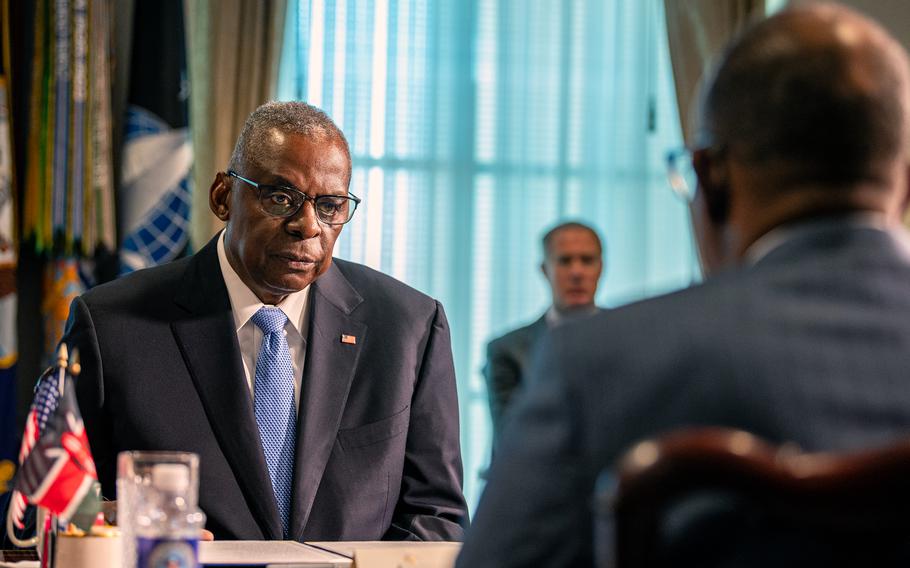
Defense Secretary Lloyd Austin and Kenyan Minister of Defense Aden Duale meet at the Pentagon on Wednesday, Feb. 7, 2024. (Eugene Oliver/Department of Defense)
WASHINGTON – The Pentagon has completed its internal review of Defense Secretary Lloyd Austin’s failure to notify the president and other U.S. officials about his prostate cancer and subsequent hospitalization for complications from surgery.
“The review has been submitted to Secretary Austin and he is in the process of reviewing it,” Air Force Maj. Gen. Pat Ryder, the Pentagon’s top spokesman, told reporters Thursday. “Much of the report is classified since it relates to continuity of operations. However, as the secretary has said, we remain committed to being as transparent as possible about the review and we’ll have more information once the secretary’s review is complete.”
Ryder provided no other details, including whether the 30-day review includes any recommendations for disciplinary actions.
Austin will make his first trip since his hospitalization next week with Air Force Gen. Charles “CQ” Brown, chairman of the Joint Chiefs of Staff. They will travel to Brussels for an in-person meeting of the Ukraine Defense Contact Group on Feb. 14, the day that Austin was to appear before the House Armed Services Committee to testify about why his recent hospital stay was kept secret from lawmakers and other top officials.
The House hearing has since been rescheduled to Feb. 29 and Austin will testify, Ryder said Thursday.
Austin apologized last week for failing to disclose his prostate cancer diagnosis, the surgery that followed, and complications that led to an extended hospital stay.
“I want to be crystal clear, we did not handle this right. I did not handle this right,” he told reporters at the Pentagon. “I should have told the president about my cancer diagnosis. I should have told my team and the American people, and I take full responsibility.”
Austin returned to the Pentagon on Jan. 29 after being absent for nearly a month because of his cancer and complications from the surgery. The secretary was released from Walter Reed National Military Medical Center in Bethesda, Md., on Jan. 15 after spending two weeks there following the surgery, which was conducted Dec. 22. Austin has come under scrutiny after he failed to notify President Joe Biden and other government officials about his illness and hospitalization.
During a regular health screening in early December, Austin’s cancer was detected. He was admitted to the hospital about three weeks later for surgery, which required general anesthesia. He left the hospital the following morning.
On Jan. 1, Austin returned to Walter Reed after experiencing pain in his abdomen, hip and leg. He was later found to have a urinary tract infection, and Austin spent days in the intensive care unit before he was moved to a private section of the hospital.
But during Austin’s medical treatments, no one at the Defense Department notified the White House, Deputy Defense Secretary Kathleen Hicks, Congress or the public for several days.
On Jan. 2, Austin transferred some of his more pressing responsibilities to Hicks. Austin said last week that he was experiencing fever, chills and shallow breathing on that day and doctors decided to move him to the intensive care unit for several days of close monitoring.
Yet Biden did not learn of Austin’s prostate cancer until Jan. 9. That same day, the White House ordered all Cabinet members or secretaries must immediately notify the administration if at any time they cannot perform their duties.
The secretary said last week he did not direct anyone on his staff to conceal information about his health. Austin said he has apologized to Biden for not immediately disclosing his diagnosis and treatment.